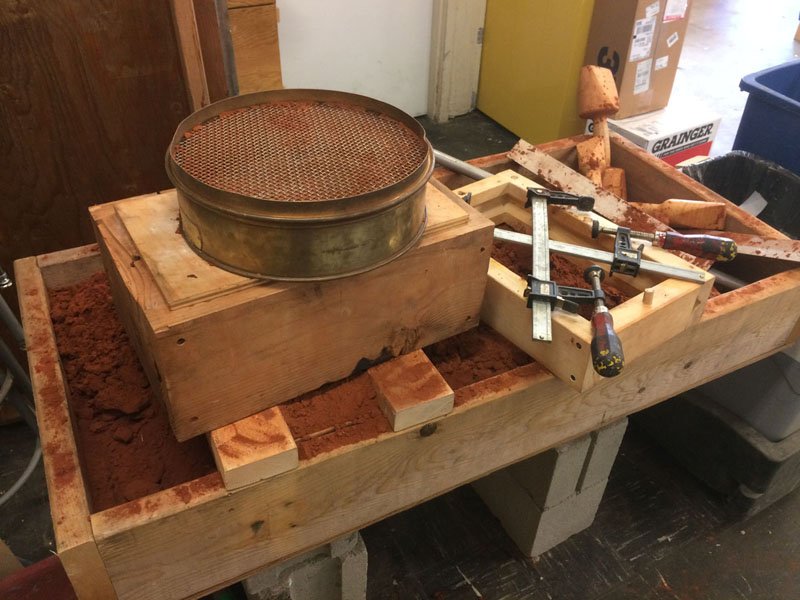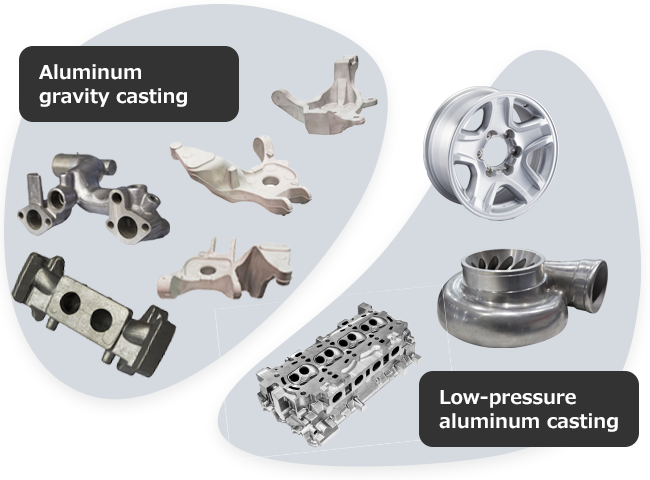Exactly How Aluminum Foundry Adds To Advancements in Aerospace Engineering
Aluminum shops are essential to advancements in aerospace design. They generate lightweight, high-strength components that are essential for modern-day airplane. Through innovative spreading techniques, these foundries produce complex geometries that boost architectural stability. In addition, the advancement of superior Aluminum alloys sustains the sector's emphasis on fuel efficiency and sustainability. Nonetheless, difficulties continue to be in the production procedure. Comprehending these variables discloses the extensive influence of Aluminum on aeronautics's future.
The Importance of Lightweight Products in Aerospace Style
As the aerospace sector remains to advance, the importance of lightweight products becomes progressively noticeable. The demand for efficiency and sustainability drives designers to prioritize making use of products that lower total weight without endangering architectural stability. Light-weight materials, specifically Aluminum, play an important role in enhancing fuel effectiveness, enhancing haul capability, and raising the total performance of aircraft.
In addition, the combination of these materials enables for ingenious styles, allowing makers to develop even more aerodynamic shapes that can hold up against severe conditions. The decrease in weight not only reduces operational costs however also contributes to a decreased environmental impact, aligning with worldwide initiatives toward sustainability in air travel.
Advanced Casting Techniques in Aluminum Foundries
Advanced spreading techniques in Aluminum factories play a vital function in aerospace design by allowing the manufacturing of lightweight and specific components. Innovations in mold and mildew style and precision spreading processes are crucial in accomplishing ideal efficiency and architectural integrity. In addition, the advancement of light-weight alloys enhances the total efficiency and efficiency of aerospace applications.
Ingenious Mold And Mildew Style
Innovative mold and mildew style plays a crucial function in the effectiveness and effectiveness of Aluminum shops, particularly within the aerospace sector. By leveraging innovative products and methods, modern mold and mildews can be crafted to withstand high temperatures and pressures, making certain peak efficiency during the spreading procedure. These layouts usually incorporate complex geometries that permit the manufacturing of light-weight yet structurally sound components, vital for aerospace applications. Additionally, using computer-aided layout (CAD) software promotes precise modeling, allowing foundries to mimic and fine-tune mold layouts before physical manufacturing begins. This not only improves the high quality of cast parts but additionally reduces waste and preparation, resulting in substantial price financial savings. Overall, innovative mold and mildew style is a keystone of development in Aluminum Foundry modern technology for aerospace engineering.
Precision Casting Processes
The effectiveness of cutting-edge mold and mildew styles seamlessly incorporates with precision spreading procedures, which are important for creating high-grade Aluminum components in aerospace engineering. These processes, consisting of sand spreading, die casting, and financial investment spreading, ensure the development of complex geometries with limited resistances. Advanced techniques like vacuum cleaner spreading and stress die casting enhance the honesty and surface area finish of the final items. Precision spreading lessens material waste while optimizing the mechanical properties of Aluminum, important for aerospace applications. Additionally, utilizing real-time monitoring and advanced simulation tools throughout the casting procedure permits immediate modifications, resulting in improved top quality control. Jointly, these accuracy casting procedures placement Aluminum shops at the leading edge of aerospace development, supporting the industry's need for reliability and efficiency.
Lightweight Alloy Growth
As aerospace engineers seek to improve fuel effectiveness and performance, light-weight alloy development becomes an essential emphasis in Aluminum shops. These factories utilize innovative spreading strategies to develop alloys that offer remarkable strength-to-weight proportions. Advancements in alloy make-up, consisting of the incorporation of elements like lithium and magnesium, make it possible for the production of materials that withstand severe problems while lowering total airplane weight. Techniques such as die spreading and financial investment spreading promote the accuracy manufacturing of intricate forms, which are essential for aerospace applications. Furthermore, recurring research aims to maximize these alloys for enhanced mechanical buildings and boosted resilience. By prioritizing lightweight alloy growth, Aluminum shops greatly add to the advancement of aerospace engineering, leading the way for a lot more efficient and lasting airplane designs.

Enhancing Architectural Honesty Via Aluminum Components
Aluminum elements use considerable benefits in enhancing architectural stability within aerospace engineering. Their lightweight nature contributes to general efficiency while maintaining toughness, which is crucial for aircraft performance. Additionally, the stress resistance properties of Aluminum assistance guarantee the resilience and dependability of aerospace frameworks under numerous functional problems.
Light-weight Material Conveniences
While standard products frequently endanger weight for stamina, making use of Aluminum components in aerospace design supplies considerable advantages in architectural honesty. Aluminum's lightweight nature adds to total style performance, enabling even more streamlined aircraft that consume less fuel, thus boosting sustainability. The product's excellent strength-to-weight proportion assurances that components maintain resilience without adding unnecessary mass. This top quality promotes boosted performance and agility in trip, along with optimized payload abilities. In addition, Aluminum's resistance to deterioration prolongs the life expectancy of aerospace frameworks, reducing maintenance costs and enhancing safety Going Here and security. As makers increasingly adopt Aluminum alloys, the aerospace industry experiences a transformative shift in the direction of a lot more reliable and efficient design services that prioritize both efficiency and environmental obligation.
Stress And Anxiety Resistance Characteristics
Although various materials have special residential properties, Aluminum's remarkable stress and anxiety resistance stands out as a crucial factor in improving the architectural stability of aerospace elements. This resistance plays a vital duty in guaranteeing that airplane can endure various functional stress and anxieties, including fatigue, influence, and ecological conditions. Aluminum alloys, particularly engineered for aerospace applications, display high tensile strength while maintaining lightweight features, making it possible for designers to create a lot more reliable structures - Aluminum Foundry. Additionally, the capacity of Aluminum to sustain cyclic loading without substantial contortion adds to the longevity and integrity of aerospace parts. As innovations proceed in Aluminum Foundry strategies, the growth of stress-resistant Aluminum parts assures more improvements in efficiency, safety, and performance across the aerospace industry, solidifying Aluminum's role as a preferred product in modern-day design
Fuel Performance Improvements Driven by Aluminum Innovations
As the aerospace market seeks to boost fuel performance, innovative uses Aluminum have emerged as a vital remedy. Aluminum's lightweight nature especially decreases aircraft weight, enabling reduced gas usage throughout flight. This reduction in weight is crucial, as even small reductions can lead to significant enhancements in total fuel economic situation.
Advanced Aluminum alloys, made for boosted stamina and resilience, allow suppliers to create parts that keep architectural honesty while minimizing mass - Aluminum Foundry. In addition, the combination of Aluminum in airframes and engine components promotes improved the rules of aerodynamics, contributing to decreased drag and boosted efficiency
The adoption of Aluminum in aerospace not just satisfies the need for fuel-efficient layout however also lines up with governing stress for reduced emissions. As these technologies continue to progress, they play a significant function in setting new standards for fuel effectiveness, guaranteeing that the aerospace field can satisfy growing moved here economic and environmental obstacles.

The Role of Aluminum in Sustainable Air Travel Practices
The boosting focus on lasting air travel techniques has placed Aluminum as a vital material in the quest for greener aircraft style. Understood for its light-weight residential or commercial properties, Aluminum substantially minimizes airplane weight, causing lower gas consumption and exhausts. Its recyclability additionally boosts its sustainability profile, as Aluminum can be recycled forever without loss of high quality. This particular sustains a round economic situation within the air travel field, decreasing waste and resource deficiency.
Moreover, improvements in Aluminum alloys have enhanced their strength and deterioration resistance, permitting longer service life and minimized maintenance requirements. These technologies facilitate the advancement of a lot more effective airplane frameworks, contributing to overall sustainability efforts. Furthermore, Aluminum's thermal conductivity plays a critical duty in energy-efficient layouts, improving systems such as heat exchangers. Collectively, these features highlight Aluminum's essential function in progressing lasting aviation, lining up with worldwide campaigns intended at reducing the environmental effect of flight.
Obstacles Dealt With by Aluminum Foundries in Aerospace Production
While Aluminum factories play a vital duty in aerospace production, they face considerable obstacles that can affect manufacturing efficiency and quality. One major difficulty is the rigorous quality assurance standards needed in the aerospace industry. Any problem can compromise safety and security and performance, necessitating rigorous inspection processes that prolong manufacturing timelines. In addition, foundries commonly compete with varying resources expenses, which can influence pricing and success. The complexity of Aluminum alloys made use of in aerospace applications further makes complex the manufacturing process, as precise formulas are crucial for accomplishing desired mechanical residential or commercial properties. Experienced labor shortages impede the ability to preserve top notch production levels. Environmental guidelines enforce restrictions on discharges and waste administration, needing foundries to spend in lasting methods, which can be cost-prohibitive. These elements collectively produce a landscape where Aluminum foundries have to constantly adjust to fulfill the developing needs of aerospace manufacturing while guaranteeing safety and compliance.
Future Patterns in Aluminum Applications for Aerospace Design
With developments in innovation and increasing demands for performance, the future of Aluminum applications in aerospace engineering is poised for significant transformation. The integration of cutting-edge Aluminum alloys and composites is anticipated to boost strength-to-weight proportions, bring about even more fuel-efficient aircraft designs. Furthermore, advancements in additive production techniques will enable the production of complex Aluminum structures that were formerly impossible, maximizing performance and minimizing waste.

Sustainable techniques will play a necessary duty, with an expanding emphasis on reusing Aluminum to decrease environmental impact. The aerospace field is most likely to embrace smarter producing processes, such as automation and expert system, making certain better and precision in Aluminum elements. Collaborations between Aluminum factories and aerospace firms will certainly cultivate research study and advancement, leading the means for new applications that fulfill the strict requirements of modern aerospace engineering. In general, the future looks guaranteeing for Aluminum's duty in shaping the skies
Regularly Asked Concerns
What Are the Environmental Impacts of Aluminum Production in Aerospace?
The ecological effects of Aluminum manufacturing in aerospace consist of substantial power consumption, greenhouse gas discharges, and environment interruption. Additionally, mining processes can lead to dirt destruction and water contamination, increasing problems about sustainability and ecological balance.
How Does Aluminum Compare to Other Products in Aerospace Applications?
Aluminum offers a special mix of lightweight residential properties, rust resistance, and cost-effectiveness compared to various other products. Its high strength-to-weight ratio makes it particularly helpful for aerospace applications, enhancing fuel effectiveness and general efficiency in aircraft style.
What Certifications Do Aluminum Foundry Workers Need for Aerospace Projects?
Aluminum Foundry workers require specialized training in metallurgy and casting strategies, along with knowledge of aerospace sector standards. Certifications in quality assurance and safety and security protocols are additionally vital to guarantee conformity with stringent aerospace project demands.
Are There Any Type Of Safety Interest In Using Aluminum in Aerospace Engineering?
Safety and security problems relating to Aluminum in aerospace design include susceptibility to corrosion, exhaustion, and stress and anxiety cracks. Appropriate treatment and alloy choice are vital to alleviate these threats, guaranteeing structural stability and general safety and security in aerospace applications.
Exactly How Does Aluminum Recycling Advantage the Aerospace Industry?
Aluminum recycling significantly benefits the aerospace sector by minimizing product prices, decreasing ecological impact, and preserving power. This lasting technique improves the industry's effectiveness while advertising making use of lightweight, high-performance components in airplane production.
Advanced spreading strategies in Aluminum factories play a crucial duty in aerospace design by making it possible for the manufacturing of lightweight and precise elements. Cutting-edge mold style plays a crucial role in the effectiveness and performance of Aluminum foundries, particularly within the aerospace market. As aerospace engineers seek to boost gas performance and performance, lightweight alloy development ends up being a necessary emphasis in Aluminum foundries. Aluminum alloys, particularly crafted for aerospace applications, display high tensile toughness while preserving light-weight attributes, making it possible for engineers to make extra efficient frameworks. Collaborations in between Aluminum factories and aerospace companies will foster study and growth, leading the means for new applications that fulfill the strict needs helpful hints of contemporary aerospace engineering.